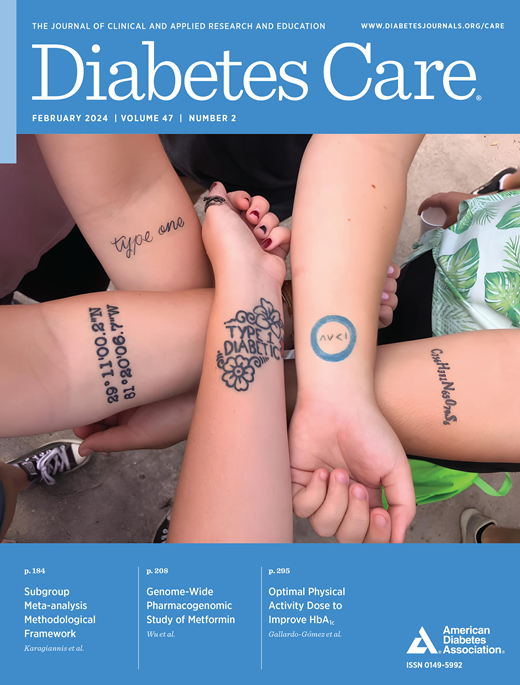血糖水平改变2型糖尿病合并妊娠孕妇妊娠期体重增加与新生儿体重的关系
IF 16.6
1区 医学
Q1 ENDOCRINOLOGY & METABOLISM
引用次数: 0
摘要
目的探讨血糖水平是否改变2型糖尿病合并妊娠妊娠体重增加(GWG)与妊娠结局之间的关系。研究设计和方法:本多中心回顾性研究对1642例妊娠晚期糖尿病孕妇进行血糖控制分层。按组分析孕产GWG (eGWG)过高与妊娠结局的关系。结果:尽管与GWG充足的孕妇相比,所有eGWG患者的出生体重、巨大儿和剖宫产的几率更高,但与最佳血糖控制相比,次优血糖控制对出生体重和巨大儿的影响估计显著更高(出生体重增加:分别为361.04和126.07 g, P = 0.007;巨大儿的调整优势比:4.26比2.73,P = 0.002;剖宫产:1.86比1.52,P = 0.738)。结论:如果不能达到最佳血糖控制,应谨慎对待过于严格的体重控制。本文章由计算机程序翻译,如有差异,请以英文原文为准。
Glycemic Level Modifies the Relationship Between Maternal Gestational Weight Gain and Neonatal Birth Weight in Type 2 Diabetes–Complicated Pregnancies
OBJECTIVE To examine whether glycemic level modifies the association between gestational weight gain (GWG) and pregnant outcomes in type 2 diabetes–complicated pregnancies. RESEARCH DESIGN AND METHODS This multicenter retrospective study stratified 1,642 pregnant women with diabetes by third-trimester glycemic control. Associations between excessive GWG (eGWG) and pregnant outcomes were analyzed by group. RESULTS Although birth weight and odds of macrosomia and cesarean delivery were higher for all women with eGWG relative to those with adequate GWG, the effect estimates for birth weight and macrosomia were significantly higher with suboptimal glycemic control compared with optimal control (birth weight increase: 361.04 vs. 126.07 g, respectively, P = 0.007; adjusted odds ratio for macrosomia: 4.26 vs. 2.73, P = 0.002; cesarean delivery: 1.86 vs. 1.52, P = 0.738). CONCLUSIONS Overly stringent weight control should be treated with caution if optimal glycemic control is not achieved.
求助全文
通过发布文献求助,成功后即可免费获取论文全文。
去求助
来源期刊

Diabetes Care
医学-内分泌学与代谢
CiteScore
27.80
自引率
4.90%
发文量
449
审稿时长
1 months
期刊介绍:
The journal's overarching mission can be captured by the simple word "Care," reflecting its commitment to enhancing patient well-being. Diabetes Care aims to support better patient care by addressing the comprehensive needs of healthcare professionals dedicated to managing diabetes.
Diabetes Care serves as a valuable resource for healthcare practitioners, aiming to advance knowledge, foster research, and improve diabetes management. The journal publishes original research across various categories, including Clinical Care, Education, Nutrition, Psychosocial Research, Epidemiology, Health Services Research, Emerging Treatments and Technologies, Pathophysiology, Complications, and Cardiovascular and Metabolic Risk. Additionally, Diabetes Care features ADA statements, consensus reports, review articles, letters to the editor, and health/medical news, appealing to a diverse audience of physicians, researchers, psychologists, educators, and other healthcare professionals.
 求助内容:
求助内容: 应助结果提醒方式:
应助结果提醒方式:


